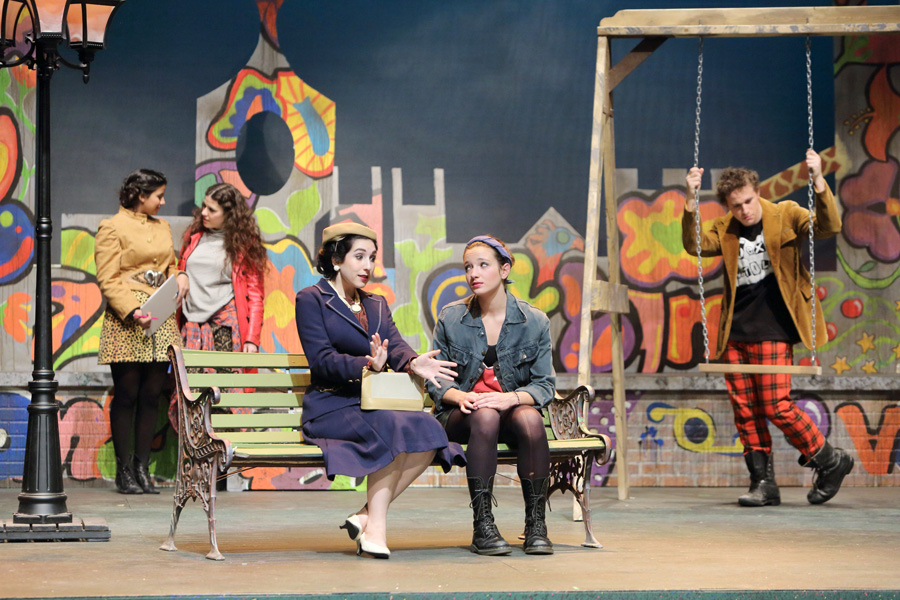The director’s note uses the words “oppression” and “repression” to describe the McGill English Drama & Theatre Program’s play Cloud 9, and those two words couldn’t have summed up the production more accurately. Cloud 9 explores these main themes within two separate but thematically connected spheres; the first act takes place in Victorian-era colonial Africa, and the second one is set in 1970’s punk London.
The contrast between the two time periods is central to its production. Each actor plays a role in both acts as a way of bending the norms of gender, race, and sexuality. The first act opens with a family headed by a colonist, Clive, singing a tongue-in-cheek song about their idyllic Victorian life. This sets the tone for the play, as from this point on, the Victorian ideals they sing about devolve into a manic destructive spiral. Suddenly, extramarital sex and references to homosexuality, homophobia, and pedophilia appear with abandon.
The second act takes place about 100 years later. Issues of homosexuality and marriage still arise—however, instead of pedophilia, the taboo topic of this act is incest. We are so involved in the show’s reality that we forget the incest occurring on stage is wrong; here, right and wrong are no longer clearly defined. Seemingly a more liberal and free narrative—characters admit their homosexuality, their extramarital affairs, and their sexual habits openly—we see that they actually contain their emotions and actions out of fear. Unlike the first act where fear comes externally, it surfaces here from an anxiety about their true selves.
The play is self-aware in that it questions itself and what it does. In the first act, the play references the traditional veneer of the characters when the actors break the flow of narrative and stiffen up like puppets, moving as if they were attached to strings from above the set. In the second act, the characters’ frustrations explode into a rage of electronic-punk fuelled song. The play toys with the viewer’s expectations of theatre in more ways than one, by choosing actors to play characters that rupture the norms of gender and race. Cloud 9 tries desperately to get a message across: things turn ugly when you reject your true identity.

To communicate this message, the actors walk a fine line between drama and comedy, and stray away from the completely ridiculous via moments of earnestness. In act one, Joshua (Leo Imbert), Clive’s black servant, exhibits the struggle of identities within his character. He breaks from his happy caricature of a man and tells Clive’s son Edward a ‘bad’ story of how mankind grew from a great spirit, who threw mud to create the moon. Joshua quickly stiffens up, smiles, and says: “Adam and Eve is true.” The play is full of moments of ‘truths’ like this one.
Although the nuances of the actors’ portrayals of their characters are ultimately successful, the gender-bending in the first act is disappointing. Betty, who is played by Harrison Collett, is too absurd to take seriously. Collett is never convincingly feminine, and the attempts to make her so detract from the point of making a man play her role. Oddly enough, in the second act, Collett’s portrayal of Edward, a gay young man, is more feminine than his portrayal of a woman.
Ultimately, Cloud 9 is a success because of its actors’ ability to bring levity to the themes it presents. It is a complex, engaging, and boundless production. When its characters run off the stage in search of refuge or to find someone, they are so convincing that their world does not end with the edge of the set. The temporality within the show is interesting, as characters from the first act appear in the second, and one actor even wears a t-shirt with Kate Moss’ face in act two. The show seems to say that time is without bounds: the past blends into the present, and therefore, history informs our actions. Identity, which is at the center of this play, is never really one’s own, and this makes internal conflict endemic to the human experience.
Cloud 9 continues to run from Nov. 28-30 at 7:30 p.m. at Moyse Hall Theatre in the McGill Arts building. Tickets are $10.









